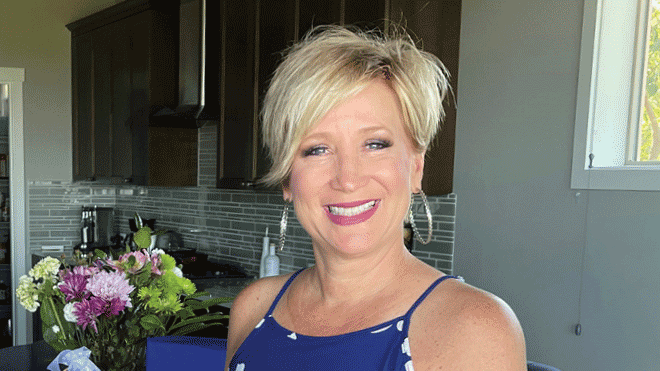
Credit Unions Positioned to Lead on Gender Equity
As part of our celebration of Women’s History Month, we're revisiting our 2021 conversation with four credit union leaders about their experiences as women in the finance world and their insights into how the member-owned cooperative model could be an important force for change.
If you talk to women who have achieved a certain level of success in the finance world, you start to notice some patterns in their stories. They didn't see their gender as a barrier, but they understood they needed to work harder than men to prove themselves. As they advanced in their careers, they noticed they were often the only women with a seat at the boardroom table, but they didn't think much about why. That's just the way it was.
After being senior executives for a while, they see things differently.
We talked with four women in a specific area of the finance field — credit unions — to learn about their experiences and hear how their perspectives have shifted. Maria Martinez is CEO of Border Federal Credit Union in Del Rio, Texas; Diana Dykstra is president and CEO of the California and Nevada Credit Union Leagues, the trade associations for credit unions in both states; Lois Kitsch is co-founder of CU Difference, an organization focused on social values and business strategies for credit unions; Melba Bartels is chief financial officer (CFO) for BECU, a credit union based near Seattle, with locations in Washington and South Carolina.
Women's Challenging Path
In finance, like most corporate career paths, the higher you go, the more positions are held by men. At the CEO level, only 2% of positions at financial institutions are held by women.
Kitsch believes women have a harder time advancing in finance, in part, because they often start lower on the org chart.
"A woman is hired to the teller line, and a man is hired to be a loan officer," said Kitsch, who started her career 42 years ago as a drive-up teller in a small credit union in North Dakota. "The path is very different to the executive suite from those positions. Where we start influences where we end up."
Where you start can also have long-term effects on how much you earn. In finance, women make 76 cents for every dollar made by men. Overall, in the U.S., women, on average, make 81 cents on the dollar for full-time work compared with their male counterparts. The gap widens for Black, Indigenous, Hispanic and Latina women. Black women make 62 cents, Indigenous women make 57 cents, and Hispanic and Latina women make 54 cents for every dollar made by white men.
A greater share of responsibility for family and household duties also falls to women, preventing many of them from advancing in their careers at the same pace as men.
"Sometimes we don't want to take that additional work responsibility — not because we don't think we can do it, but because we are mainly responsible for taking care of the kids," Martinez said. "That's held back a lot of women."
An organization's family leave policies can lead to women feeling like they have to choose between family and career. If they choose to have kids, they risk taking the "motherhood penalty," a setback in pay or career advancement that they may never recover from.
Martinez had her youngest child four months after becoming CEO. She took two weeks of leave before returning to work.
"Balancing all those jobs was hard," she said, but she was determined. She recognizes how rare her professional achievements are: "As a woman of color, there are not too many of us in higher-level positions. You don't see us in the C-suite. The majority of those positions are going to white men at the very top, especially within our asset size ($140 million). When you jump into the next level ($500 million), it's even worse."
Representation Matters
In a male-dominated industry like finance, it can be difficult for the people in charge of hiring decisions to break the cycle.
"People hire people who look like them because they're comfortable with people who look like them," Dykstra said. "Diverse experience and perspectives lead to better decisions. That's good for business and good for credit union members."
Martinez agreed. "Diversity makes companies get more creative," she said.
Her observation is that women tend to be better at building relationships and seeking input from others before making decisions. They also take fewer financial risks, providing a balanced perspective to businesses.
By passing over women for leadership positions, Bartels argues organizations are missing a huge opportunity. "Women offer a tremendous talent pool for organizations," she said. "From the business perspective, it's a waste to not tap into that."
And talent attracts talent. If women see people who look like them in leadership positions, they will be more likely to seek leadership positions themselves.
"It's important to have people to look up to who look like you," Bartels said, "and that's not specific to finance. When women serve as role models, other women can see what's possible."
Plus, Kitsch pointed out that if organizations don't have women in leadership roles, they're leaving out half the population. That's a big deal when you're in an industry that is meant to serve the whole community.
Tips for Women
Kitsch, Dykstra, Martinez and Bartels agree that it's important for change to come from the top, but they have a lot in common when it comes to steps they took to achieve success. Here are three tips for women, compiled from their experiences.
Volunteer for everything
If something needs to be done, raise your hand to do it, even if you're not sure exactly how. Too many women wait to acquire skills and education while men just give it a try. That goes for volunteering in your community, too. It's a great way to learn what your community's needs are and gain valuable leadership skills.
Advocate for yourself
If you have ideas, speak up and own them. Too often a woman's thoughts and opinions get passed over during a meeting, only to be praised when a man repeats the same idea a few minutes later. Be sure you have people's attention when you talk and speak with confidence. You earned your seat at the table just as much as the men around you. The same goes for pay. Do your research. Understand the market for your position. If you know your work is worth more than what you're being paid, talk about it with your boss.
Advocate for other women
As you move up the ladder, be sure to support other women who are coming up behind you. Use your influence to create more opportunities for them, especially women of color.
Credit Unions as Agents for Change
As member-owned cooperatives, the purpose of credit unions is to support the financial health of members, not enrich shareholders. Because of that, all four women believe credit unions are uniquely suited to improve equity and close the gender gap, not just within their own organizations, but in the community.
"Credit unions are global instruments of change," Kitsch said. "Access to financial services is one of the biggest indicators of what a family's financial future will look like and how they will economically progress."
Martinez added that the service focus of credit unions makes them different from other companies. "We tend to hire people for their attitude and their feelings," she said. "It's not based just on what they know because you can train them on that. You can't train people to care."
Credit unions still have their own work to do to increase the number of women in leadership, especially women of color. But the cooperative model gives them a good foundation to start from.
"When we're all aligned to a common purpose, the competition falls away and the collaboration comes forward," Bartels said. "It's a more supportive and inclusive environment where people thrive, and that benefits women in the workplace."
Resources
The above article is intended to provide generalized financial information designed to educate a broad segment of the public; it does not give personalized financial, tax, investment, legal, or other business and professional advice. Before taking any action, you should always seek the assistance of a professional who knows your particular situation when making financial, legal, tax, investment, or any other business and professional decisions that affect you and/or your business.


